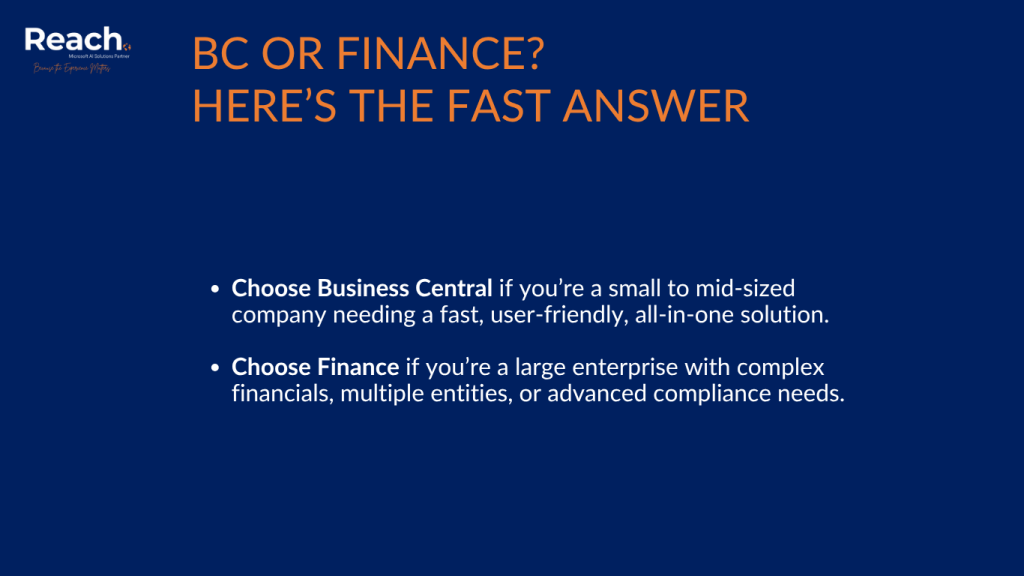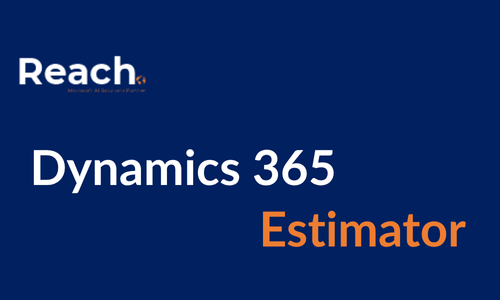The complete guide to choosing between Microsoft’s two ERP solutions
Microsoft Dynamics 365 Business Central vs Finance and Operations isn’t just about features—it’s about finding the solution that fits your business like a perfectly tailored suit. Make the wrong choice, and you’ll either pay for capabilities you’ll never use or discover you’re missing critical functionality after it’s too late to change course.
If you’re wrestling with this decision, you’re not alone. These two platforms serve different markets, have different strengths, and require different investments. Let’s break down everything you need to know to make the right choice for your business.

The Quick Answer (But Keep Reading)
Choose Business Central if: You’re a small to mid-market company looking for a complete, integrated business solution that’s relatively quick to implement and easy to use.
Choose Finance if: You’re a larger enterprise with complex financial requirements, multiple subsidiaries, advanced compliance needs, or require deep functionality capabilities.
But like most business decisions, the devil is in the details. Your industry, growth plans, existing systems, and specific requirements all play crucial roles in this decision.
Understanding the Fundamental Differences
Think of Business Central as the Swiss Army knife of ERP systems—it does everything you need competently, comes ready to use, and doesn’t overwhelm you with complexity. Finance, on the other hand, is like a professional chef’s knife set—incredibly powerful and precise, but requires expertise to use effectively.
D365 Business Central: The All-in-One Solution
Business Central combines ERP, CRM, and business intelligence into one integrated package. It’s designed for businesses that want a complete solution without the complexity of managing multiple systems. You get financial management, supply chain, manufacturing, project management, and customer relationship management all working together seamlessly.
D365 Finance: The Enterprise Powerhouse
Finance focuses specifically on financial management but does it with enterprise-grade depth and sophistication. It’s built for complex financial operations, multi-entity consolidation, advanced compliance requirements, and businesses that need maximum flexibility in their financial processes.
Business Central: When Simplicity Meets Power
Perfect For:
- Companies with 5-100 employees
- Businesses wanting an all-in-one solution
- Organizations prioritizing quick implementation
- Companies with straightforward business processes
- Teams that prefer user-friendly interfaces
Core Strengths: Business Central shines when you need a complete business solution that works right out of the box. The interface feels familiar to anyone who’s used Office 365, and most users can be productive within days, not months.
The platform handles manufacturing, distribution, retail, and service industries effectively with built-in functionality that covers most standard business processes. You’re not just getting financial management—you’re getting inventory control, sales management, purchasing, project tracking, and business intelligence integrated into one cohesive system.
Real-World Scenario: A 100-employee manufacturing company chose Business Central because they needed to replace separate systems for accounting, inventory, and customer management. Within six months, they had everything integrated, their team was fully trained, and they were seeing improved efficiency across all departments.
Limitations to Consider: Business Central has user limits and may not scale to enterprise levels. If you’re planning rapid growth beyond 300 users, you might outgrow the platform. Complex multi-entity structures, advanced financial consolidation, and highly specialized industry requirements might push you toward Finance instead.
Finance: Enterprise-Grade Financial Management
Perfect For:
- Large enterprises (100+ users)
- Multi-national corporations
- Companies with complex financial structures
- Organizations requiring advanced compliance and reporting
- Businesses needing extensive flexibility and deep functionality
Core Strengths: Finance excels in complex financial scenarios that would overwhelm simpler systems. Multi-currency operations, intercompany transactions, advanced budgeting and forecasting, and sophisticated reporting capabilities are where Finance truly shines.
The platform handles unlimited legal entities, supports complex organizational structures, and provides the deep financial controls that enterprise auditors demand. If your CFO needs detailed financial analytics, complex allocation rules, or advanced cash flow management, Finance delivers.
Real-World Scenario: A global manufacturing company with operations in 15 countries chose Finance because they needed to consolidate financial data across multiple subsidiaries, handle complex transfer pricing, and provide real-time financial reporting to executives worldwide. Business Central couldn’t handle the multi-entity complexity they required.
Complexity Considerations: Finance requires more specialized expertise to implement and maintain. Your team will need more in-depth training; implementation takes longer, and ongoing management is more complex. You’re trading simplicity for power and flexibility.
Business Central vs Finance and Operations: The Feature Face-Off
Financial Management: Both platforms handle core accounting, but Finance goes deeper. Business Central covers standard financial processes effectively, while Finance provides advanced features like budget control, financial dimensions, and sophisticated allocation rules.
Reporting and Analytics: Business Central includes solid reporting with Power BI integration. Finance offers enterprise-grade financial reporting with advanced analytics, regulatory reporting, and complex consolidation capabilities.
User Experience: Business Central prioritizes ease of use with intuitive interfaces. Finance provides more functionality but requires more training to use effectively.
Customization: Business Central allows reasonable customization for most businesses. Finance offers extensive customization options for complex enterprise requirements.
Integration: Both integrate well with other Microsoft products, but Finance provides more sophisticated integration options for complex enterprise environments.
Cost Implications: More Than License Fees
Business Central Total Cost:
- Lower licensing costs per user
- Faster, less expensive implementation
- Lower ongoing maintenance costs
- Less specialized expertise required
Finance Total Cost:
- Higher per-user licensing costs
- More expensive, longer implementations
- Higher ongoing maintenance and support costs
- Requires more specialized consultants and staff
The cost difference often extends beyond obvious licensing fees. Finance implementations typically take 2-3 times longer than Business Central projects, require more specialized consultants, and need more ongoing support.

Which Dynamics 365 solution is right for you?
Use Our Quick Estimator Tool and Find Out in Minutes
Making the Decision: Key Questions
Size and Growth: How many users do you have now, and where will you be in five years? Business Central works well up to about 300 users, while Finance scales to thousands.
Complexity: Do you operate multiple legal entities? Have complex intercompany transactions? Need sophisticated financial consolidation? These scenarios favor Finance.
Timeline: Do you need to be operational quickly? Business Central typically implements faster. Can you invest in a longer implementation for more functionality? Finance might be worth the wait.
Budget: What’s your total budget for software, implementation, and ongoing costs? Be realistic about the full investment, not just licensing fees.
Expertise: Do you have or can you hire people with enterprise ERP experience? Finance requires more specialized knowledge to implement and maintain effectively.
The Growth Path Dilemma
One common scenario: you’re a mid-sized company that might grow into enterprise territory. Do you start with Business Central and potentially migrate later, or invest in Finance upfront?
There’s no universal answer, but consider this: migrating from Business Central to Finance later is possible but expensive and disruptive. If you’re confident about significant growth and have the budget for Finance now, it is the better long-term choice.
However, if growth is uncertain or budget is tight, starting with Business Central and upgrading later might make more sense. Many successful companies have made this transition.
Beyond the Platform: Implementation Success
Regardless of which platform you choose, implementation approach matters more than the platform itself. Poor implementation can make the best platform a disaster, while good implementation can maximize the value of either solution.
Consider your implementation partner carefully, plan for proper change management, and budget for adequate training. These factors often determine success more than the platform choice itself.
Stop Guessing—Get Personalized Guidance
Choosing between Business Central and Finance shouldn’t be a guessing game based on generic advice. Your decision depends on your specific industry, company size, growth plans, budget, and dozens of other factors unique to your situation.
Stop guessing your ERP costs. In just a few clicks, our free Estimator Tool helps you assess Microsoft Dynamics 365 Business Central and Finance—with cost ranges, effort scope, and timelines tailored to your business.
The tool doesn’t just give you cost estimates—it helps you understand which platform makes sense for your specific situation. Based on your responses about company size, industry, complexity, and requirements, you’ll get personalized recommendations about which solution fits your needs and budget.
You’ll see realistic cost comparisons, implementation timelines, and potential challenges for both platforms based on your specific context. No more wondering if you’re making the right choice—get data-driven insights that help you decide with confidence.
Try our free Estimator Tool now and discover which Dynamics 365 solution is right for your business, complete with personalized cost estimates and implementation guidance.
The right ERP platform can transform your business, but the wrong choice can be costly and disruptive. Our Estimator Tool takes the guesswork out of choosing between Business Central and Finance, giving you personalized recommendations based on your specific needs and situation.

